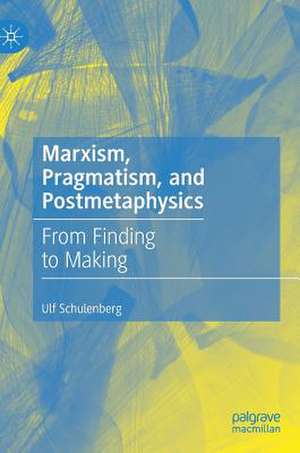Marxism, Pragmatism, and Postmetaphysics: From Finding to Making
Autor Ulf Schulenbergen Limba Engleză Hardback – 6 mar 2019
From Finding to Making offers the first detailed discussion of the relationship between Marxism and pragmatism. These two philosophies of praxis are not incompatible, and an analysis of their relation helps one to better understand both. Establishing a transatlantic theoretical dialogue, this book discusses similarities and differences between these philosophies. It is an interdisciplinary study that brings together philosophy, American and European intellectual history, and literary studies. Schulenberg’s book shows that if we seek to continue the unfinished project of establishing a genuinely postmetaphysical culture, the attempt to elucidate the dialectics of Marxism and pragmatism is a good starting point. The book offers detailed discussions of Sidney Hook, Georg Lukács, Theodor W. Adorno, Fredric Jameson, W.E.B. Du Bois, John Dewey, Richard Rorty, and Jacques Rancière.
Preț: 519.93 lei
Preț vechi: 611.68 lei
-15% Nou
Puncte Express: 780
Preț estimativ în valută:
99.53€ • 102.37$ • 82.57£
99.53€ • 102.37$ • 82.57£
Carte tipărită la comandă
Livrare economică 15 februarie-01 martie
Preluare comenzi: 021 569.72.76
Specificații
ISBN-13: 9783030115593
ISBN-10: 3030115593
Pagini: 275
Ilustrații: VIII, 244 p.
Dimensiuni: 148 x 210 mm
Greutate: 0.45 kg
Ediția:1st ed. 2019
Editura: Springer International Publishing
Colecția Palgrave Macmillan
Locul publicării:Cham, Switzerland
ISBN-10: 3030115593
Pagini: 275
Ilustrații: VIII, 244 p.
Dimensiuni: 148 x 210 mm
Greutate: 0.45 kg
Ediția:1st ed. 2019
Editura: Springer International Publishing
Colecția Palgrave Macmillan
Locul publicării:Cham, Switzerland
Cuprins
1. Introduction.- 2. Early Encounters: Sidney Hook, Richard J. Bernstein, and George Novak.- 3. Resuscitating Georg Lukács: Form, Metaphysics, and the Idea of a New Realism.- 4. “Kunst hat soviel Chance wie die Form”: Theodor W. Adorno and the Idea of a Poeticized Culture.- 5. “This morning I read as angels read”: Self-Creation, Aesthetics, and the Crisis of Black Politics in W.E.B. Du Bois’s Dark Princess.- 6. Marxism, Pragmatism, and Narrative.- 7. Marxism, Pragmatism, and Postcritique.- 8. From Finding to Making: Jacques Rancière, Richard Rorty, and the Antifoundationalist Story of Progress.- 9. Stories of Emancipation and the Idea of Creative Praxis: Karl Marx and John Dewey.- 10. Conclusion.
Notă biografică
Ulf Schulenberg teaches American studies at the University of Bremen, Germany. He is the author of Zwischen Realismus und Avantgarde: Drei Paradigmen für die Aporien des Entweder-Oder (2000), Lovers and Knowers: Moments of the American Cultural Left (2007), and Romanticism and Pragmatism: Richard Rorty and the Idea of a Poeticized Culture (2015), as well as the coeditor of Americanization-Globalization—Education (2003) and a special issue on American Rock Journalism (2017). He has published widely in the fields of literary and cultural theory, American and European intellectual history, and American studies.
Textul de pe ultima copertă
'This is the first full-scale engagement between two great intellectual traditions often thought to be antithetical: Marxism and Pragmatism. Focusing on human emancipation and social progress as the common element, Ulf Schulenberg offers an urgent and capacious analysis of how recent and contemporary debates—from Lukács and Adorno to Jacques Rancière, and from Dewey and Rorty to Richard Bernstein—shape and are shaped by this problematic. Rarely have discussions about post-metaphysical philosophy and aesthetic theory been brought together with such deftness and rigor. In short, this is a field-defining book that no one interested in either tradition, or in critical theory tout court, can afford to ignore.' — Robert Doran, Professor of French and Comparative Literature, University of Rochester, USA
Caracteristici
Argues that Marxism and pragmatism are not incompatible Brings together literary studies, philosophy, and (American and European) intellectual history Demonstrates that if we seek to continue the unfinished project of establishing a genuinely postmetaphysical culture, the attempt to highlight the dialectics of Marxism and pragmatism is a good starting point
